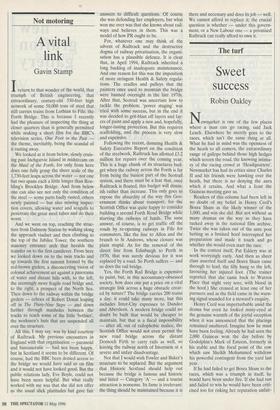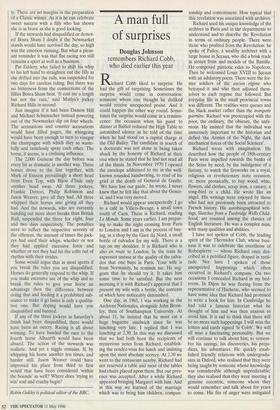The turf
Sweet success
Robin Oakley
Newmarket is one of the few places where a man can go racing, said Jack Leach. Elsewhere he merely goes to the races, which isn't the same thing at all. What he had in mind was the openness of the heath to all comers, the extraordinary range of gallops behind those high hedges which screen the road, the knowing intima- cy of the racing crowd at `Headquarters'. Newmarket has had its critics since Charles II and his friends were hawking over the heath, but there is no denying the aura which it retains. And what a feast the Guineas meeting gave us.
Readers of this column had been left in no doubt of my belief in Henry Cecil's Bosra Sham as the likely winner of the 1,000, and win she did. But not without as many dramas on the way as they have tucked away in the national film archive. Twice she was taken out of the ante post betting as a bruised hoof interrupted her preparation and made it touch and go whether she would even start the race.
In the contest itself, Pat Eddery was at work worryingly early. And then as sheer class asserted itself and Bosra Sham came through to lead, the filly hung to the left, favouring her injured foot. (The trainer reported that she came back to Warren Place that night very sore, with blood in the hoof.) She crossed at least one of her pursuers and as the field came in the warn- ing signal sounded for a steward's enquiry.
Henry Cecil was imperturbable amid the drama but even he looked misty-eyed at the genuine warmth of the joyful reception when it was announced that the placings remained unaltered. Imagine how he must have been feeling. Already he had seen the 2,000 Guineas won the day before by Godolphin's Mark of Esteem, formerly in his stable and the focal point of the row which saw Sheikh Mohammed withdraw his powerful contingent from the yard last year.
If he had failed to get Bosra Sham to the races, which was a triumph in itself, he would have been under fire. If she had run and failed to win he would have been criti- cised too for risking her reputation unfair- ly. There are no margins in the preparation of a Classic winner. As it is he can celebrate sweet success with a filly who has shown she is as brave as she is good looking.
If the stewards had disqualified or demot- ed Bosra Sham I doubt if the Newmarket stands would have survived the day, so high was the emotion running. But what a pleas- ant reminder it was that flat racing too still remains a sport as well as a business.
Pat Eddery, who failed to shift his whip to his left hand to straighten out the filly as she drifted into the rails, was suspended for two days for careless riding. But there was no bitterness from the connections of the fillies Bosra Sham beat. 'It cost me a length but not the race,' said Matiya's jockey Richard Hills in second.
Just imagine if it had been Damon Hill and Michael Schumacher instead powering out of the Newmarket dip on four wheels. The accusations and counter accusations would have filled pages, the whingeing would have been enough to turn to vinegar the champagne with which they so waste- fully and tastelessly spray each other. The horse, it seems, is a civilising influence.
The 2,000 Guineas the day before was every bit as dramatic in another way. Three horses drove to the line together, with Mark of Esteem prevailingly a short head from Even Top, with Bijou d'Inde only another head away. All three jockeys, Frankie Dettori, Philip Robinson and Jason Weaver, gave all they had. All three whipped their horses into giving all they had. And the stewards, who are currently handing out more short breaks than British Rail, suspended the three for eight, four and two days respectively. The penalties were to reflect the respective severity of the offences, the amount of times the jock- eys had used their whips, whether or not they had applied excessive force and whether or not they had hit the colts out of rhythm with their strides.
Some would argue that in most sports if you break the rules you are disqualified. Horses do generally respond to the whip. If you make excessive use of the whip and so break the rules to give your horse an advantage then the difference between doing that and feeding it a prohibited sub- stance to make it go faster is only a qualita- tive one. But doping would have you disqualified and banned.
If any of the three jockeys in Saturday's finish had been disqualified, there would have been an outcry. Racing is all about winning. To have handed the race to the fourth horse Alhaarth would have been absurd. The action of the stewards was realistic. And yet a niggle remains. If, by whipping his horse another ten times, and harder still, Jason Weaver could have improved his place from third to first would that have been considered 'within the bounds' as well? Where does 'trying to win' end and cruelty begin?
Robin Oakley is political editor of the BBC.



































































 Previous page
Previous page